If you follow social networks, you can easily name the topics of the most popular posts. War, the army, fallen defenders, civilian victims of Russian aggression, heroism of the Ukrainian military and atrocities of Russians – this kind of content steadily receives a large number of reactions. Add to this a considerable advertising budget, the absence of any professional standards or moral inhibitions – and you will get millions of subscribers to whom you can “feed” any necessary information.
“Bukvy” continues to investigate the activity of Facebook profiles and pages. Two years ago, we analyzed a number of fan pages of President Zelensky on Instagram, investigated the network of fake accounts and Facebook pages, which at that time were used to promote and support the authorities in scandals. One of the users of such “services” was, in particular, the adviser to the head of the President’s Office Mykhailo Podoliak.
Facebook sometimes reacts to the results of investigations and blocks networks of fake accounts. This happened with the network discovered by “Bukvy”, which turned out to be connected to MP Andrii Derkach, who is under sanctions in the USA and is suspected of high treason in Ukraine, and former Prime Minister Volodymyr Groysman. In a report, the company noted that the internal investigation was based on the information provided by the FBI, which shows the significant attention paid in the United States to the manipulation of public opinion on social networks.
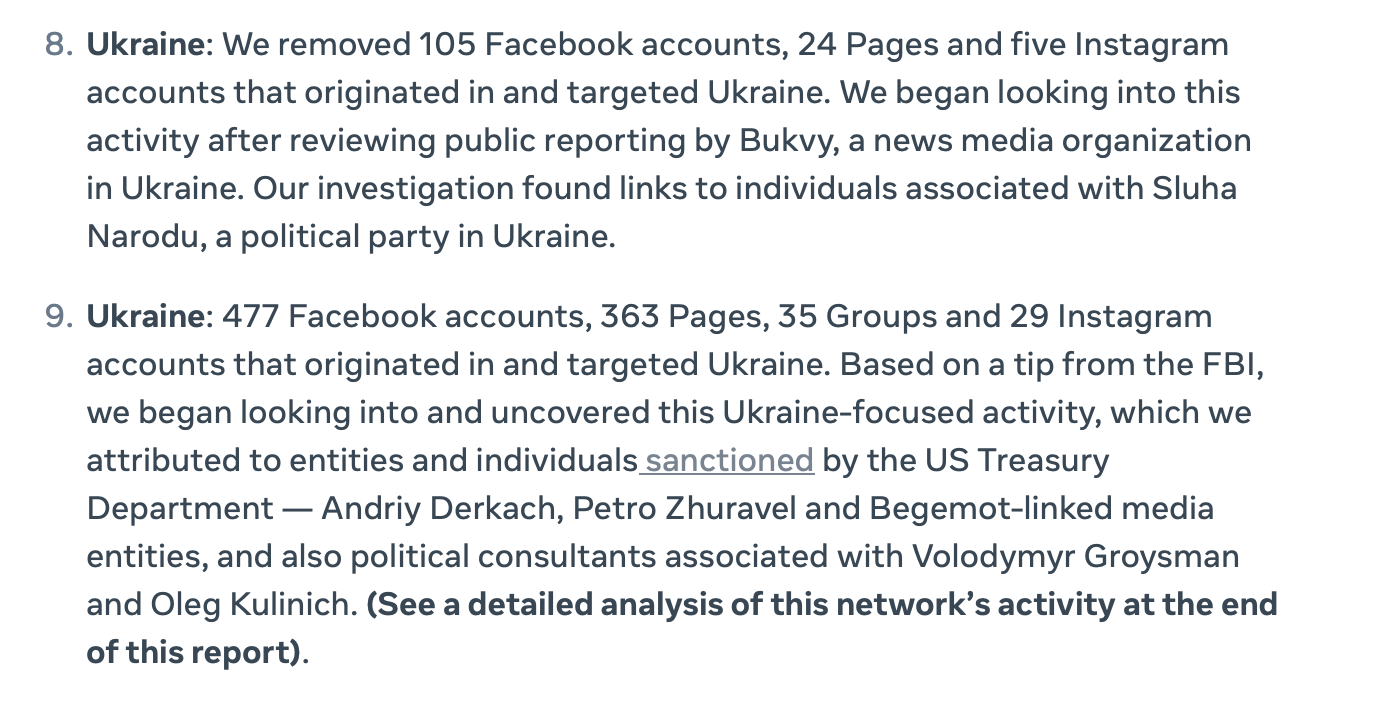
Since February 24, 2022, the use of bot farms in Ukrainian politics has somewhat lost its relevance because political processes in Ukraine have taken a back seat. From time to time the law enforcement officers report on the exposure of another bot farm, but usually the matter does not go beyond phrases about the removal of “200 proxy servers”.
Such a situation and a change in the current agenda could not help but affect the Facebook pages. Of course, bot profiles have not gone anywhere, but if earlier they were used for likes and comments in support of some politicians and hate others, now the need for this has almost disappeared due to the decline of public interest in the activities of politicians and public (better political) consensus regarding the priority of the threat from Russia over all other problems.
Of course, bot “personal profiles” are still used if necessary. As an example of such a situation, we can cite the experience of Channel 5 journalist Hanna Rybalka, who had asked President Zelensky a rather sharp question during a press conference on February 24, 2023, and the next day she received a whole wave of hate messages. It can be assumed that it is the sincere supporters of the president who spent several evenings searching for Ms. Rybalka’s page (which only lists her profession, but not her place of work) and expressed their displeasure. In that case, you could find critical comments under her post about that press conference. But there is only one such comment, and it is very far from claiming to be a hater. So we have a classic, albeit rare case of a coordinated attack.

Another such example is a post on Petro Poroshenko’s page about the opening of a volunteer bakery in liberated Kherson. The post went viral (54,000 likes, 18,000 comments, 1.7 million views), so it is quite logical that there are critical comments about the fifth president. However, if we look at the profiles of the authors of the most “scolding” hater comments, we will see a typical picture – a profile without content or a closed profile (this option became a salvation for bot farm owners, allowing them to disguise as real people who are worried about their safety), only an avatar or 1-2 photos, a few friends.
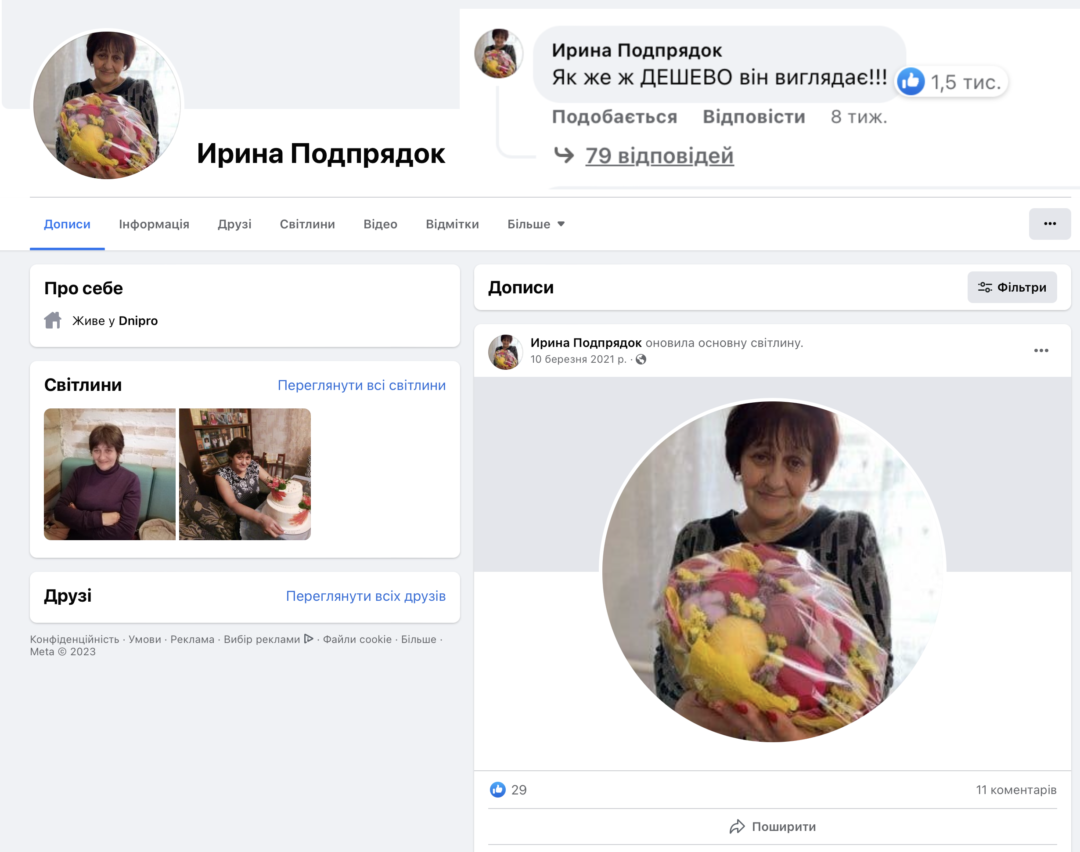
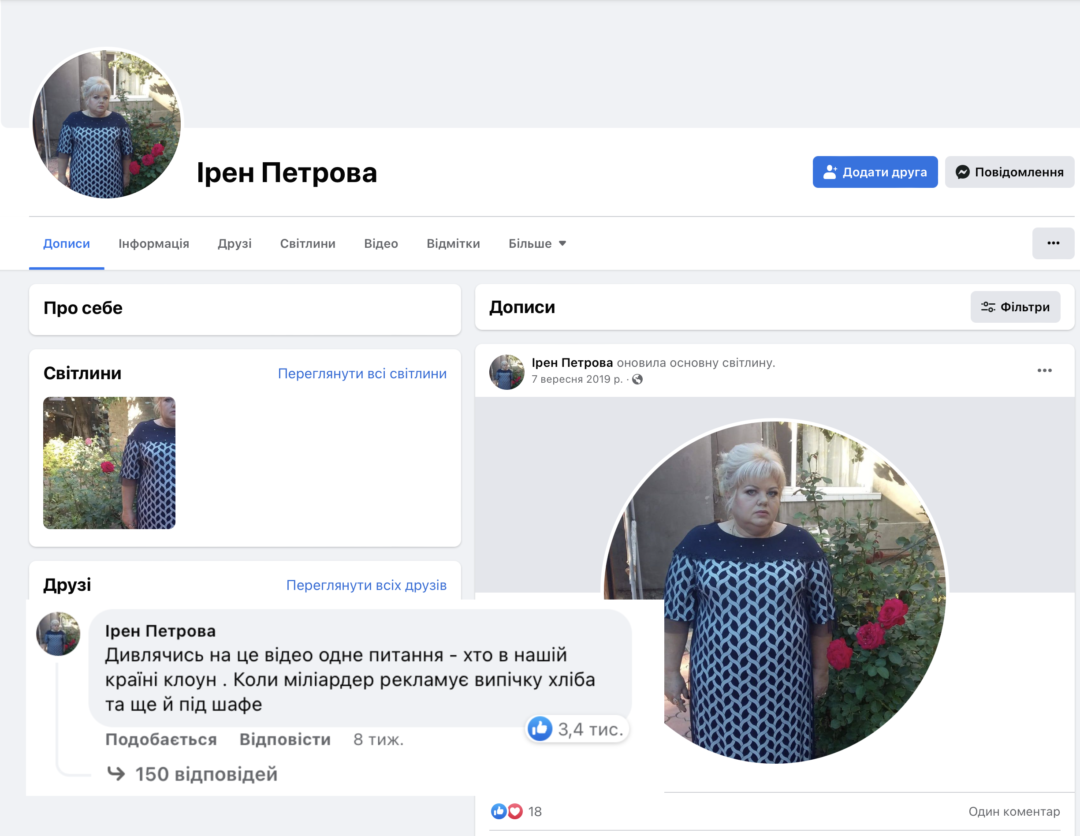
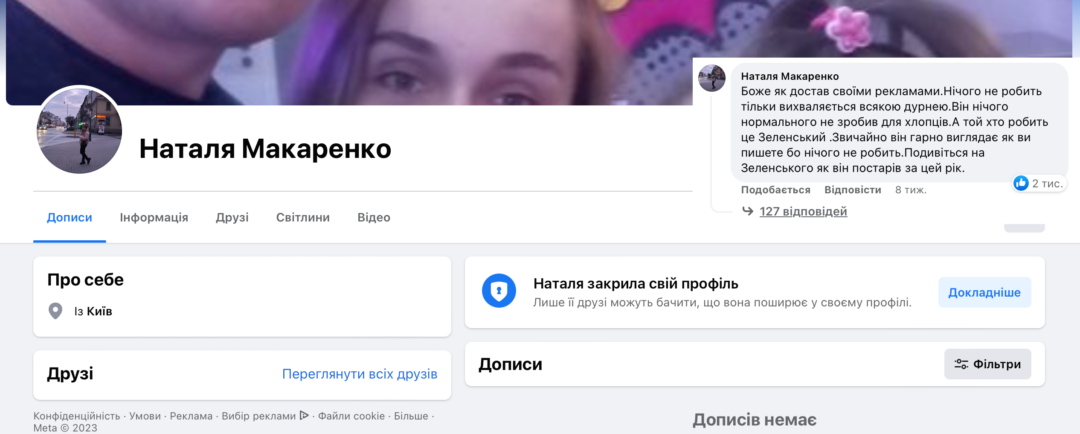
However, the fact that such cases have become infrequent does not mean that bot farms have ceased to exist and work. Rather, they transformed into something much more dangerous.
In 2022, dozens of pages filled with the most sensitive content appeared on Facebook – dead soldiers, statements about the counteroffensive, losses, quotes from General Zaluzhnyi and addresses from President Zelensky – and in most cases this content is completely or partially fake and in addition to the “promotion” of the pages itself, it also aims to redirect traffic from Facebook to third-party resources.
Let us consider several examples. The page “I love my Ukraine”, 1.1 million followers, among whom many will see their friends. It was created on February 24, 2022 – not a day when most Ukrainians had the inspiration for such activities, so the fact that two of the three administrators are from Armenia is not surprising. However, it should be noted that the page was not renamed, so the name was not invented in a hurry.
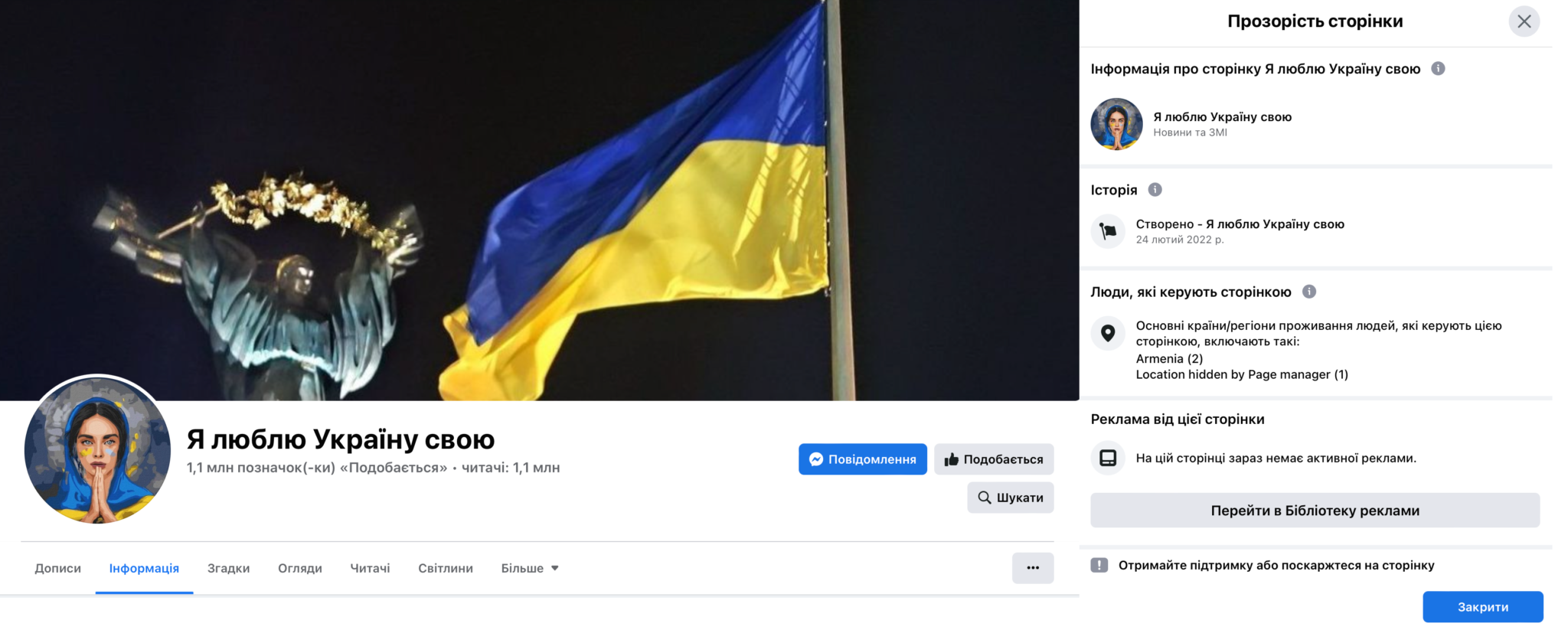
Among the latest posts is Serhiy Prytula’s post from 2017, with good activity even 6 years after it was written. In the comments, readers noticed this anachronism, but it seems that the authors are not too concerned about it. As well as a rating of 1.2 out of 5 according to reader reviews. By the way, out of a million subscribers, only 38 people left reviews. The post itself is posted on such a site that they even forgot to replace the standard WordPress designer mark on the browser tab.
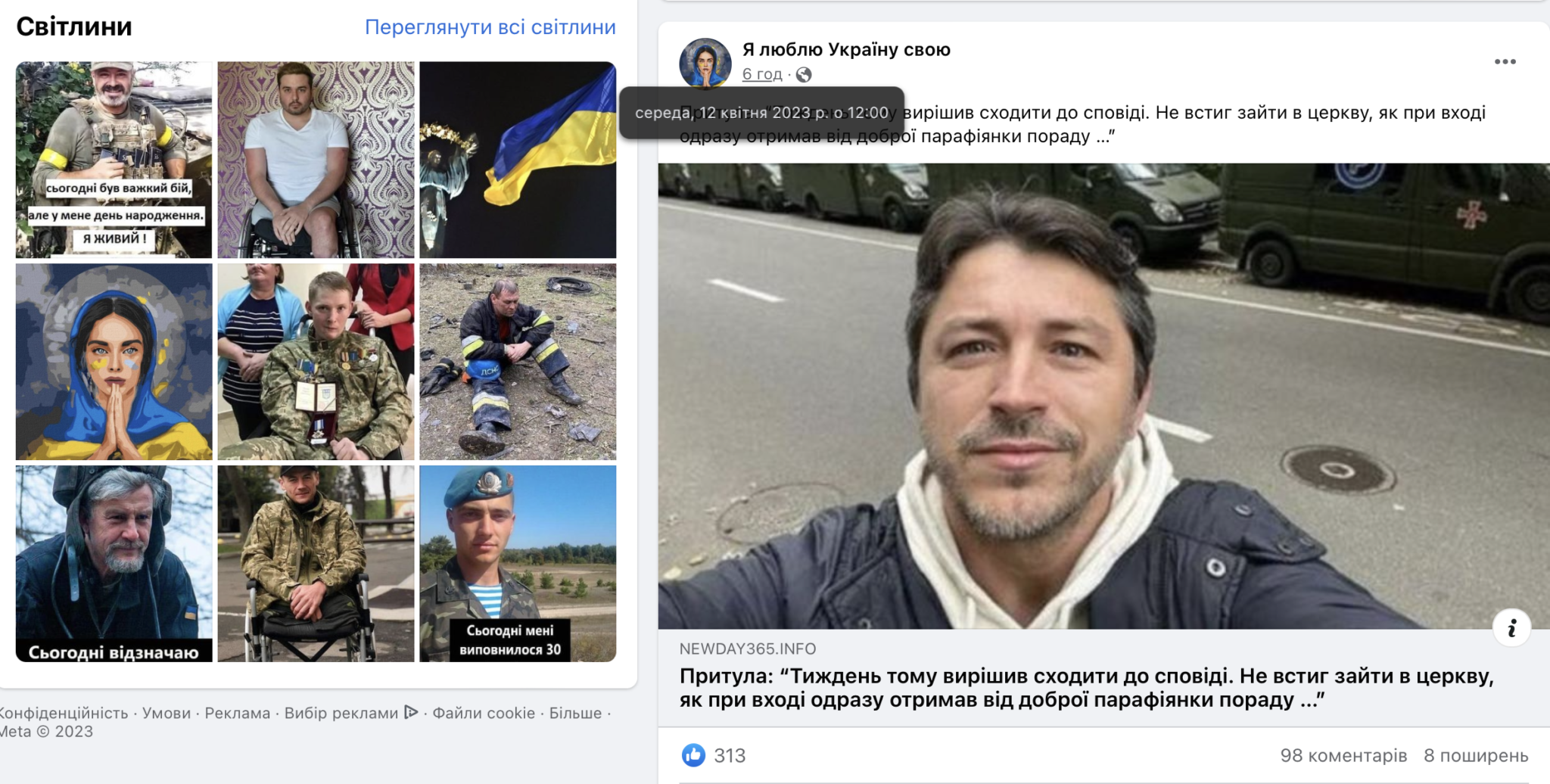
The site offers to share its… content in Russian “Odnoklassniki” and “Vkontakte” social networks, and the names of the sections look as if the editing of the standard template was abandoned halfway through. As for the content of the rest of the content, we will leave it to your discretion, but remember that the page has 1.1 million readers – not every page of a national TV channel can boast of that, not to mention other mass media.
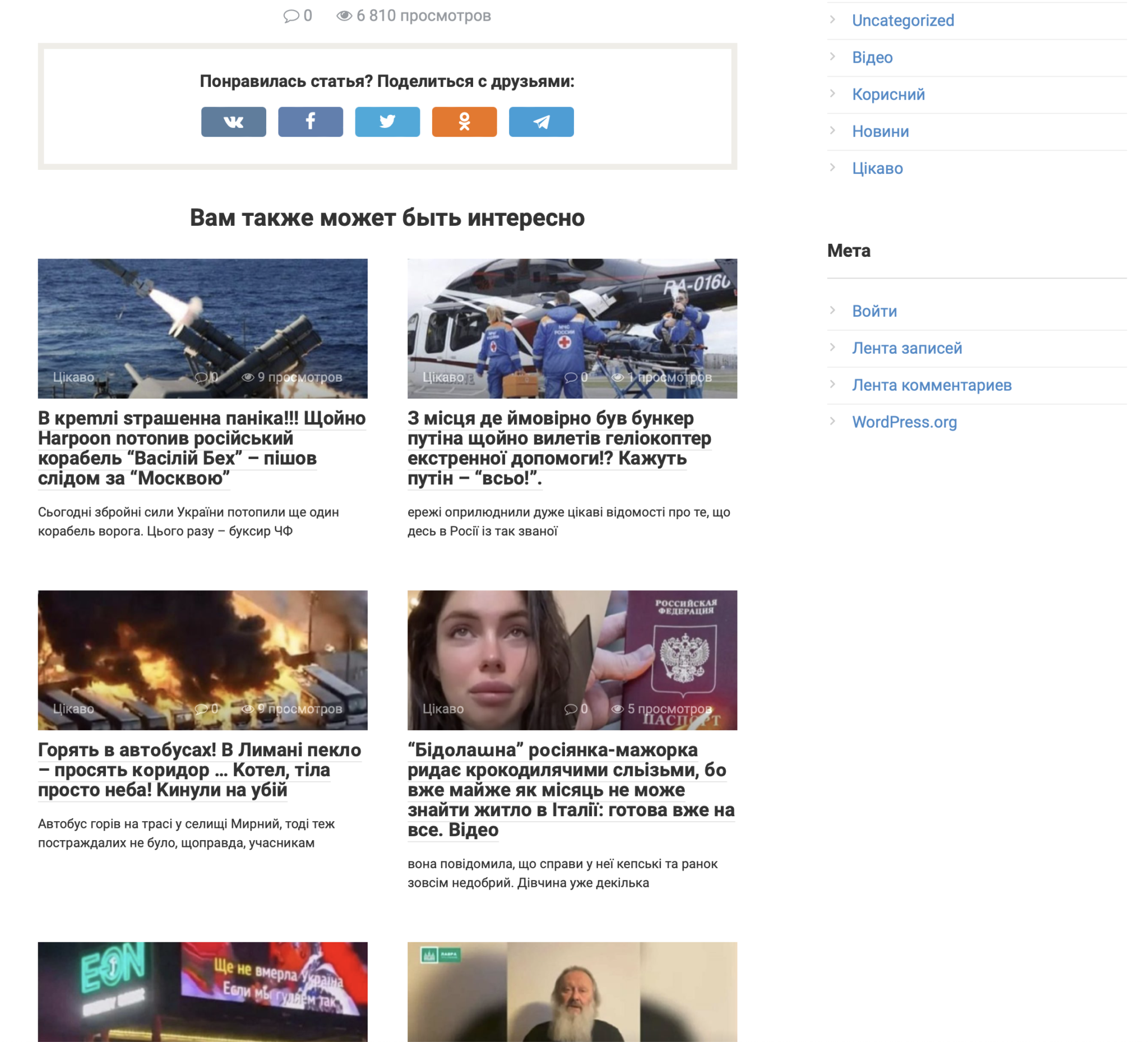
Another similar example is the “Official Ukraine” page with a million followers. This time, all administrators are from Ukraine, and it was created on February 27, 2022.

The page looks a bit abandoned, because the last post was dated September 22, 2022, but the presence of a million subscribers allows you to revive it without problems and bring content to the masses. For example, during special elections, the intention to hold which is now being talked about more and more often. After all, the presence of a million subscribers gained in half a year indicates significant costs for advertising and promotion of the page, and it is unlikely that someone simply left it.
There is no point in considering each such page, because they are made according to the same template. But to understand the scope of the problem, it is worth listing them:
- Unbreakable country – 464,000 subscribers (there is active advertising launched in October and December 2022);
- News of Ukraine – 445,000 subscribers;
- Everything will be fine – 476,000 followers;
- Invincible people – 768,000 subscribers;
- Our beloved Ukraine – 504,000 subscribers;
- Information Zone – 965,000 subscribers;
- Glory to Ukraine – 737,000 subscribers;
- Glory to the Ukrainian people – 513,000 subscribers;
- Strong Ukraine – 314,000 subscribers;
- Ukraine on time – 1,100,000 subscribers;
- Ukraine Reports – 581,000 subscribers;
- Ukraine Invincible – 399,000 subscribers;
- Glory to Ukraine – 456,000 subscribers;
- Sensations of Ukraine – 348,000 subscribers.
The following pages are slightly smaller in number of readers, but similar in content and format: Official Ukraine, World in shock, Free Ukraine, Ukraine Life, Love Ukraine, Dear Friends, With Ukraine in the Heart, News of Ukraine, New Ukraine, Ukraine Today, Ukraine You
powerful. Most of all the listed pages share several similar features:
- speculating on sensitive topics for Ukrainians (war, military, dead, children, language, etc.) by publishing fake or out-of-date posts on hot topics;
- creation date – 2022;
- the presence of administrators from Armenia, Indonesia, the Philippines, etc. (in many cases, the location of administrators is hidden).
It is worth paying attention to one more characteristic feature, which indicates that we are not dealing with scattered initiatives, but with the systematic construction of a network of disinformation.
Pay attention to the atypical appearance of some symbols in the text – letters of the Latin alphabet are used instead of Cyrillic. Such substitutions can be found in scientific papers and student term papers – this is the most typical way to “cheat” the program for checking essays for plagiarism. Also, this is a way to cheat the algorithms that rank the delivery of content depending on its uniqueness – if you need to fill 10-20-100 pages with content, creating unique publications requires considerable effort and costs. But by simple manipulations with the alphabet, you turn the same message into several pseudo-unique ones, without losing the impression and filling tens of pages with one content. There is another bonus – such “incorrectness” in writing familiar words attracts attention.
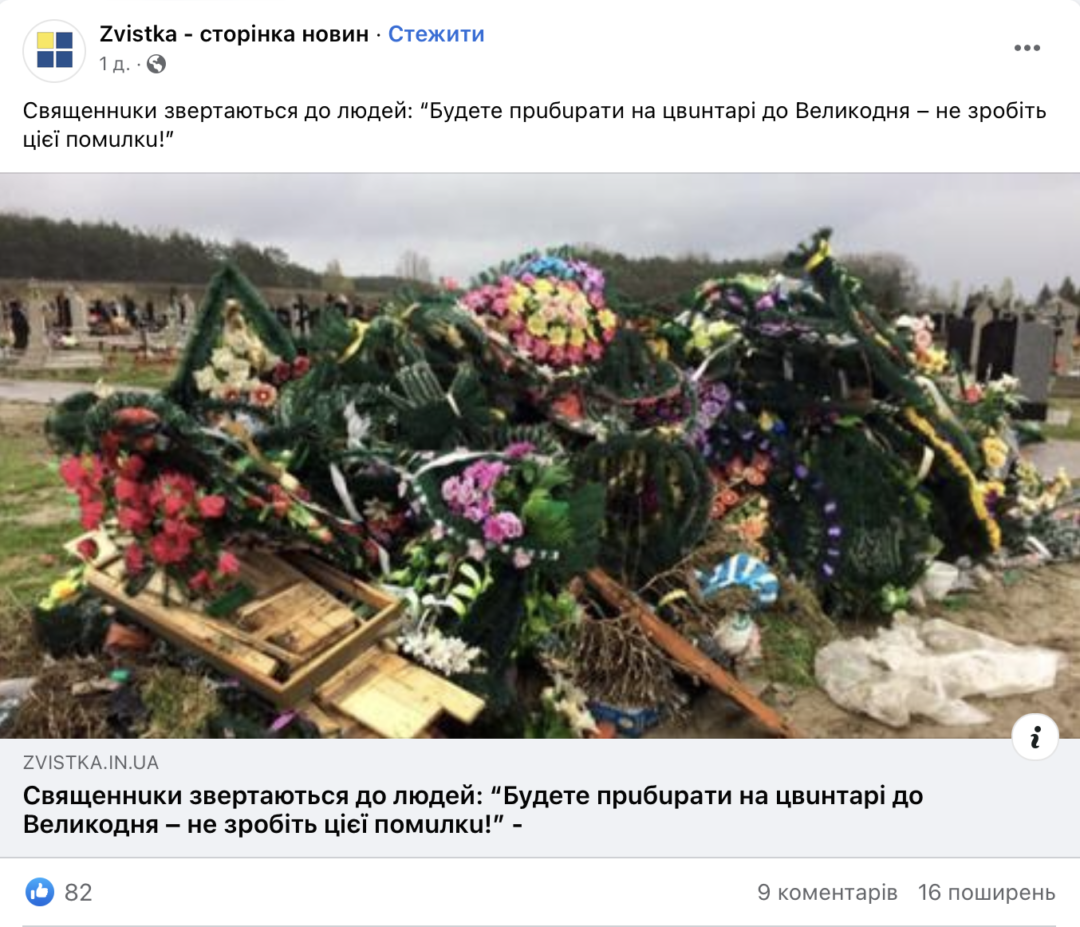
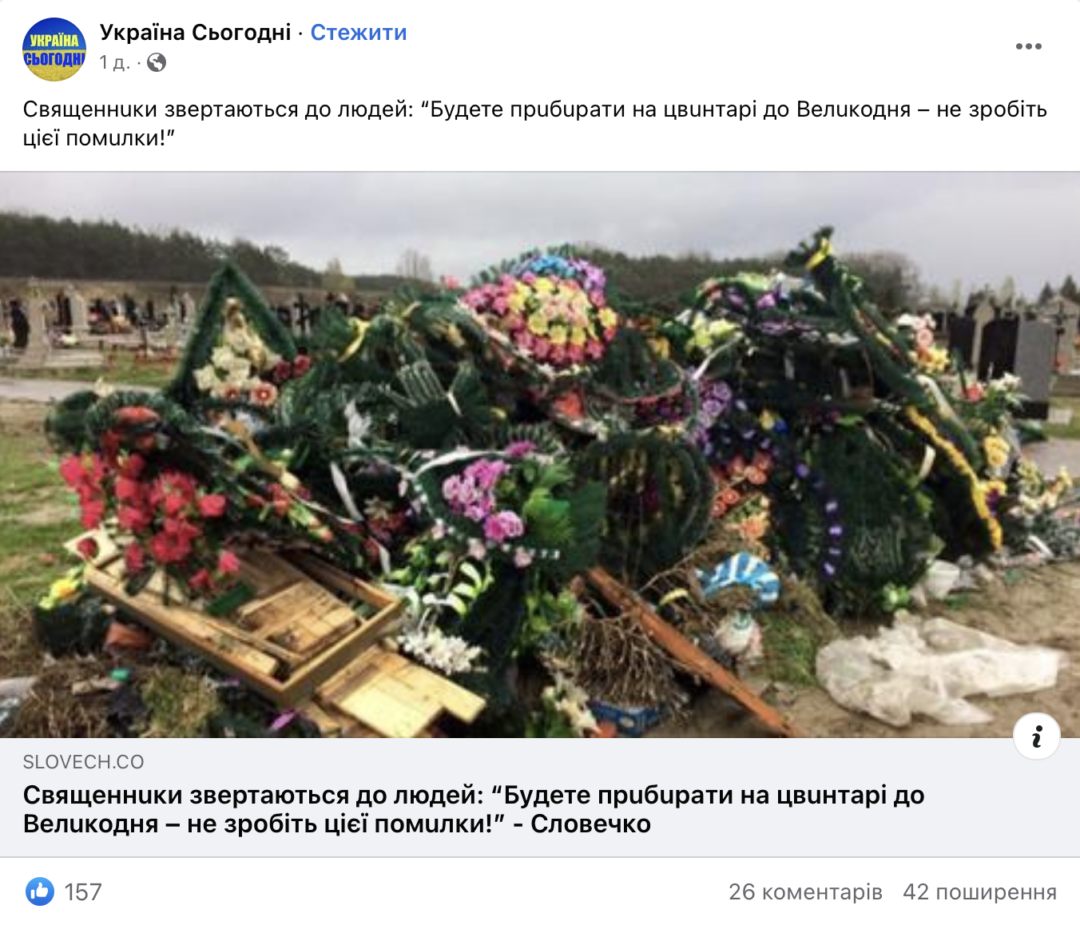
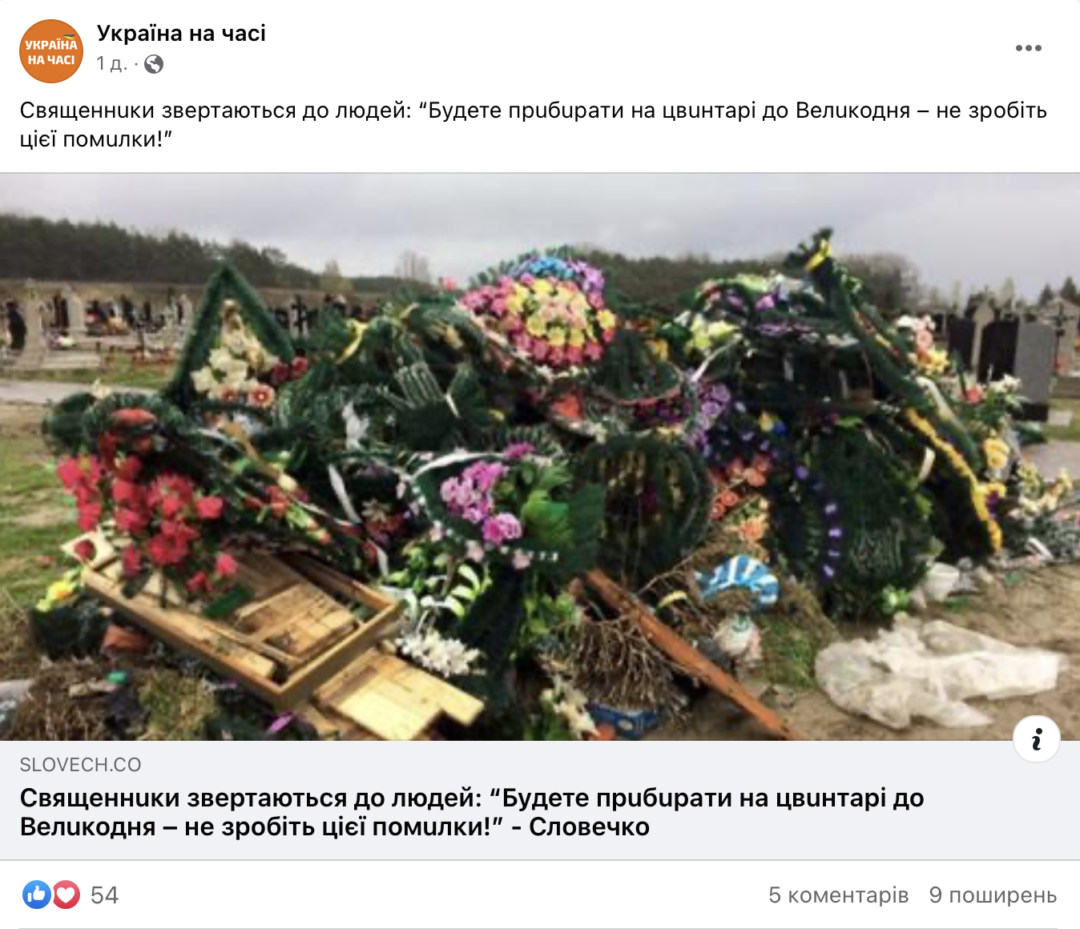
This list is not exhaustive – the above is about a quarter of the total number of pages that share these common features. The total audience of the found pages is tens of millions of subscribers, and probably much more than it was possible to track down now, although the general trend is clear.
The question remains about the goals of these pages.
The most obvious option is that these sites are being prepared for early elections, during which they will be used to highlight the real or promised successes of the government as much as possible and play on old fakes about competitors as much as possible. The theses that are voiced today by speakers from the government – about “2023 – the year of victory”, “5-7 months before the return of the Armed Forces to the territory of Crimea” – not only disagree with more than cautious forecasts of the military or Western partners, but also give grounds to assume that this unrestrained optimism has a specific purpose, and is not caused by a lack of imagination and understanding of the scale of the problems Ukraine is facing today.
On those pages that did not appear in 2022, you can find political advertising, which indicates that they are used for this purpose. Shared content (as in the screenshots above) with “newly created” pages indicates preparation for repeated use to influence election results – already on a larger scale. In order not to be verbose, let us give an example.
On the Zvistka news page, the screenshot of which was already shown above, you can find a political advertisement in favor of Volodymyr Zelensky, dated 2018-2019.
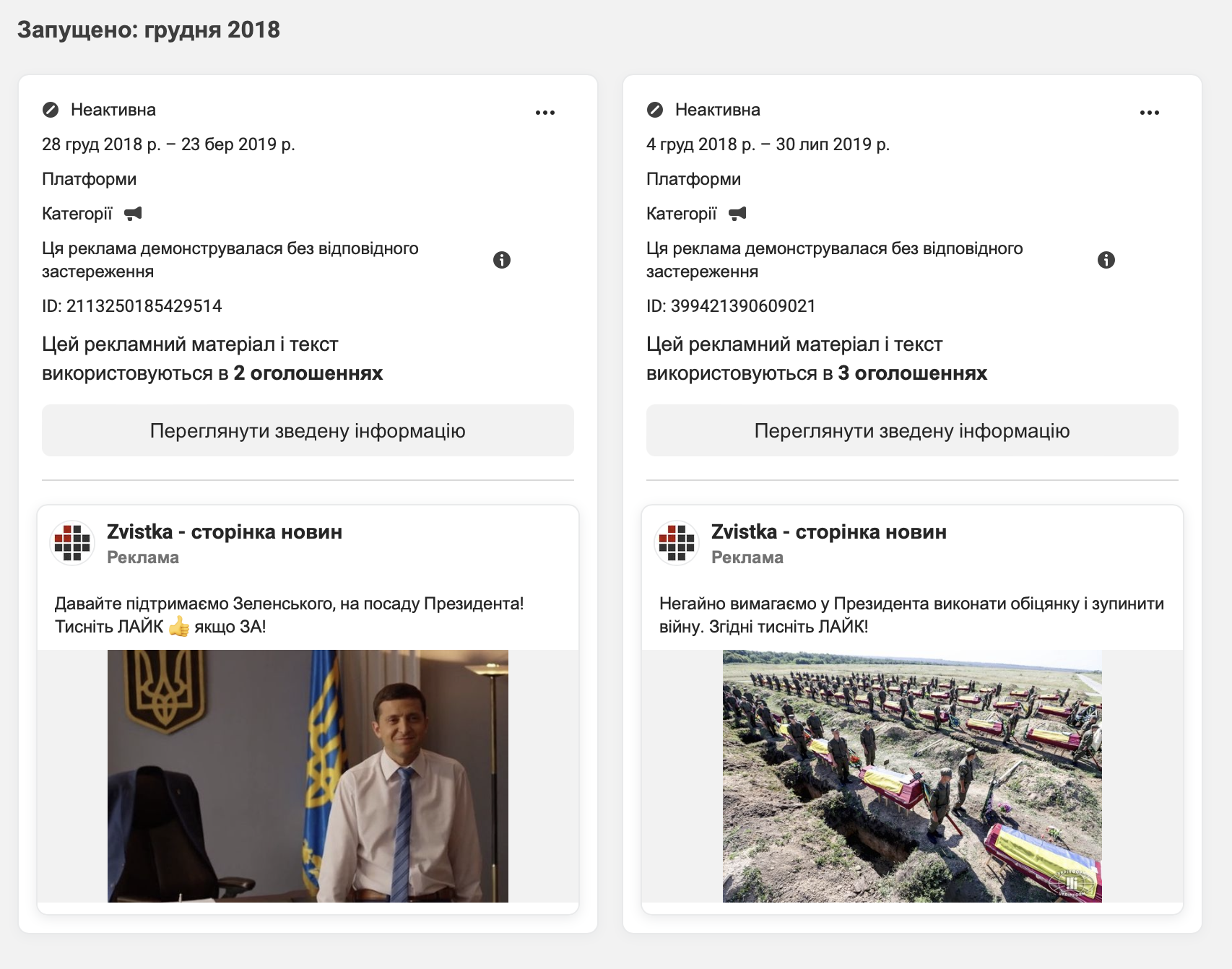
Pay attention to the dates of the advertisement – it is not only about support for then-presidential candidate Volodymyr Zelensky, but also about an attack on the then president Petro Poroshenko, since the leitmotif of his political campaign in 2019 was the continuation confrontation with Russia without concessions on the territory and sovereignty of Ukraine in favor of peace, support of the army and increasing cooperation with the EU and NATO. Volodymyr Zelensky had the opposite course until February 24, 2022 – he did not see a problem in withdrawing the Armed Forces from the front line in order to conclude a truce with the Russian Federation and repeatedly criticized Ukraine’s Euro-Atlantic course due to NATO’s alleged reluctance to meet the issue of Ukraine’s inclusion in the Alliance.
Of course, against the background of martial law and the occupation of about one-fifth of the territory of Ukraine, it is somewhat absurd to talk about real elections.
However, there is another option – this network can be purchased by Russia in its own interests. The enemy here is happy with absolutely everything – manipulation of the pain and problems of Ukrainians, confrontation of supporters of the biggest political forces today – Volodymyr Zelensky and Petro Poroshenko and their parties, accumulated dissatisfaction with a number of decisions of the authorities, which currently has no way out due to the still existing consensus regarding the untimeliness of criticism of the authorities …
If at the same time early elections are really held in Ukraine, it will simply be a jackpot for Russia – the opportunity to bring its own puppets to power by speculating on the most painful issues is a typical tactic of the Russian Federation, which can become the solution that the Kremlin is now looking for due to its inability win on the battlefield. So far, these searches have been limited to manipulative declarations of readiness for a cease-fire between strikes on residential buildings. But it is the pre-election campaign that will allow Russia to expand the field for maneuver, in particular in the West, where they are unlikely to understand the idea of “re-election as long as there is a rating.”
Of course, it would be naive to believe that Russia is “waiting” for opportunities, rather than creating them. But so far, their efforts look something like this. Such ads are published not even “one-day”, but “one-time” pages, which are forgotten immediately after the end of the advertising period, or when the ad is canceled by Meta.

Perhaps from the Russian point of view of the Ukrainians, this should bring some success, but from the Ukrainian point of view, it will only lead to the fact that part of the Russian budget will be “merged”. This does not mean that the enemy can be underestimated and the threat can be ignored in the future.

 Creative director of ROA Patrick Stengbye talking about the shoes he chooses for running, what the brand will surprise us with in 2024 and President Zelensky’s style
Creative director of ROA Patrick Stengbye talking about the shoes he chooses for running, what the brand will surprise us with in 2024 and President Zelensky’s style 




